新概念英语一册语法总复习(课堂PPT)
合集下载
Lesson4(课件)新概念英语第一册
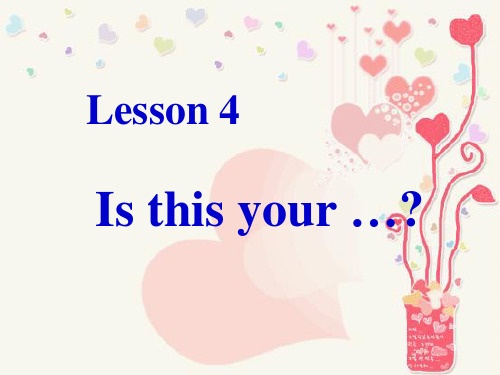
• Go there. 到那儿去。
• there 那里 • His coat is there. 他的外套在那里。
• over there 在那边 • My son is over there. 我的儿子在那边。 • where 哪里
• ticket 票 • a train ticket 一张火车票 • a movie ticket 一张电影票 • ticket office 售票处 • a bus ticket 公交车票
• umbrella [ʌm'brelə] n.伞;雨伞 • take an umbrella 带一把雨伞
• please 请 • Please open the window. 请打开窗户。 • Please be quiet. 请安静点。 • please 还有“ 求你了,拜托”的意思。
• here 这里 • Here you are, Tom. 给你,汤姆。 • I live here. 我住在这里。 • here and there 到处 • Come here. 到这儿来。
语法
• 某些祈使动词可以后跟and和另一个祈使动 词,而不是后跟带to的动词不定式结构。
• Come and see this goldfish. • Go and buy yourself a new pair of shoes. • 去给自己买双新鞋吧。 • Wait and see. 等着瞧吧。
New words and expressions:
• suit n. 一套衣服
• (1) 这是你的套装吗? • e.g. Is this your suit? • (2)女式套装 • woman’ s suit • (3)男式套装 • man’s suit • (4) v. 适合 • e.g. The suit suits me. • (5) a bathing suit
新概念英语第一册复习课件
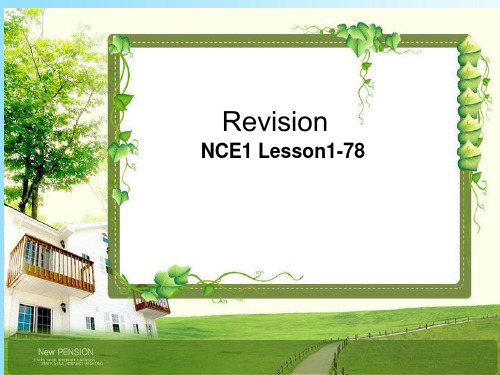
新概念英语第一册复习课件
形容词 名词前,be动词后
• dirty-clean sharp-blunt good-bad • lazy—hard-working busy-free • same-different • comfortable-uncomfortable • smart lovely tired thirsty terrible fresh
tobacco stereo refrigerator electric cooker hammer kettle teapot envelope pad change photograph passport fashion appointment noise • 学校:chalk handwriting subject conversation phrasebook • 房子:building cloakroom • 方位:middle north south east west • 疾病: temperature flu measles mumps aspirin
新概念英语第一册复习课件
• 星期:week Sunday Monday Tuesday Wednesday Thursday Friday Saturday weekend
• 季节:season spring summer autumn winter • 地点:village church dairy town • 生活:case carpet fork spoon cupboard cigarette
• 五号 • 一个新学生 • 电脑操作员 • 工程师 • 空姐 • 我女儿的 • 上楼 • 相同的颜色 • 一顶可爱的帽子 • 推销员
新概念英语第一册复习课件
• office assistant • customs officer • taxi driver • an ice cream man • the dressing table • the stereo • on the right • on the left • in the middle of • put on
形容词 名词前,be动词后
• dirty-clean sharp-blunt good-bad • lazy—hard-working busy-free • same-different • comfortable-uncomfortable • smart lovely tired thirsty terrible fresh
tobacco stereo refrigerator electric cooker hammer kettle teapot envelope pad change photograph passport fashion appointment noise • 学校:chalk handwriting subject conversation phrasebook • 房子:building cloakroom • 方位:middle north south east west • 疾病: temperature flu measles mumps aspirin
新概念英语第一册复习课件
• 星期:week Sunday Monday Tuesday Wednesday Thursday Friday Saturday weekend
• 季节:season spring summer autumn winter • 地点:village church dairy town • 生活:case carpet fork spoon cupboard cigarette
• 五号 • 一个新学生 • 电脑操作员 • 工程师 • 空姐 • 我女儿的 • 上楼 • 相同的颜色 • 一顶可爱的帽子 • 推销员
新概念英语第一册复习课件
• office assistant • customs officer • taxi driver • an ice cream man • the dressing table • the stereo • on the right • on the left • in the middle of • put on
新概念英语第一册L43-52复习课件
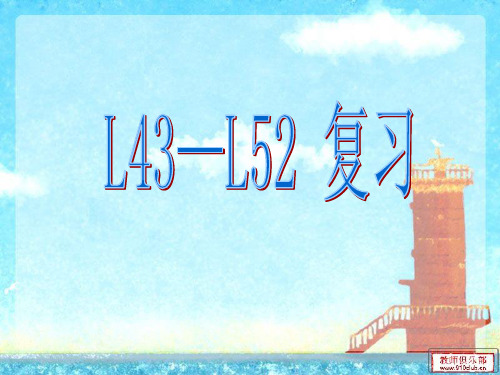
He is Swedish.
He comes from Sweden.
He is Russian. He comes from Russia.
Do some exercises:
C 1. ( ) I want to buy some beef __________. A. at the butcher B. at the butchers C. at the butcher’s 2. ( B )Jim’s brother ____ in a factory. He usually _____ to work by car. A. work, go B. works, goes C. works, go D. work, goes 3.(A ) ____ you always ____ basketball on Sundays? A. Do, play B. Does, play C. Are, playing D. Are, play 4.(B )A: I like lamb, but I don’t like beef. How about you? • B: I like lamb, _______, I don’t like beef _______. • A. either , too B. too, either C. also, neither • 5.A:Does your brother have a long ruler? • B: __________________. C • A. Yes, he is B. Yes, he doesn’t C. No ,he doesn’t D. No, he isn’t.
Autumn(september, octorber, november)
新概念英语第一册第21-22课(课堂PPT)
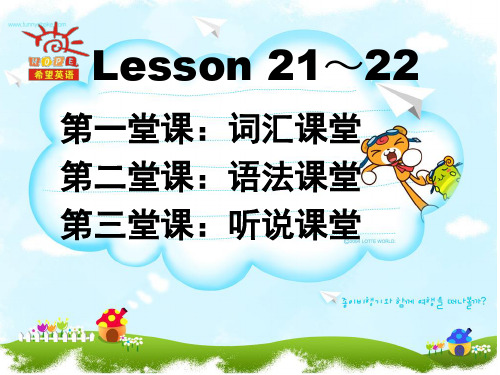
Here you are,children. 7 这些冰淇淋真好吃。。
These ice creams are nice! 8 你们现在好了吗?
Are you all right now?
5
音标复习
6
7
语音强化训练 十二
复习辅音
连滑 浊化
希望英语培训中心
8
语 音 规 律 —辅音连滑,浊化
拼读:
40
精讲课文
41
本课语言点
1.Give me a book please,Jane. 此句为祈使句。主语you省略,
后加please,表示客气的请求。 =Give a book to me,please.
give后面接复合宾语, 直接宾语为a book, 间接宾语为me。
42
本课语言点 2.Which book?哪一本书?
(How many people are there in this dialogue?)
5 Ask me who they are. (Who are they?)
51
52
16办公室office17妈妈(儿m语um) 18小sm的all
19祖父grandfa2th0e男r 人 m2a1n好,可以 right
22开着的open23祖母grandmo2th4助er手 assistant
3
本周过关句型
1 怎么啦,孩子们?。 What's the matter,children?
adj.大的 adj.小的
希望英语培训中心
14
New words and expressions
8. big [big]
adj.大的
除了具large的意思,在big修饰人的时候,主要指大人物,但个 子未必高。a big film star 著名的电影明星
These ice creams are nice! 8 你们现在好了吗?
Are you all right now?
5
音标复习
6
7
语音强化训练 十二
复习辅音
连滑 浊化
希望英语培训中心
8
语 音 规 律 —辅音连滑,浊化
拼读:
40
精讲课文
41
本课语言点
1.Give me a book please,Jane. 此句为祈使句。主语you省略,
后加please,表示客气的请求。 =Give a book to me,please.
give后面接复合宾语, 直接宾语为a book, 间接宾语为me。
42
本课语言点 2.Which book?哪一本书?
(How many people are there in this dialogue?)
5 Ask me who they are. (Who are they?)
51
52
16办公室office17妈妈(儿m语um) 18小sm的all
19祖父grandfa2th0e男r 人 m2a1n好,可以 right
22开着的open23祖母grandmo2th4助er手 assistant
3
本周过关句型
1 怎么啦,孩子们?。 What's the matter,children?
adj.大的 adj.小的
希望英语培训中心
14
New words and expressions
8. big [big]
adj.大的
除了具large的意思,在big修饰人的时候,主要指大人物,但个 子未必高。a big film star 著名的电影明星
新概念一册课件ppt
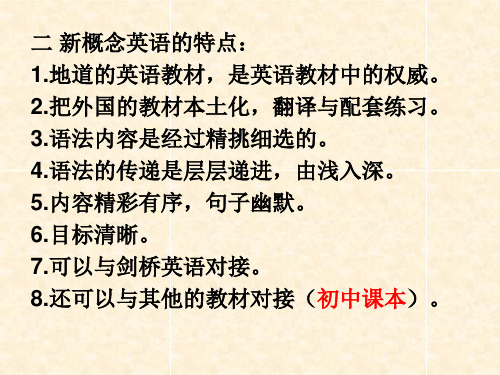
– When someone helps you .what do you
say? 当别人帮助了你,你应该说:Thank you very much
为了规范事业单位聘用关系,建立和 完善适 应社会 主义市 场经济 体制的 事业单 位工作 人员聘 用制度 ,保障 用人单 位和职 工的合 法权益
三.Grammar:一般疑问句.
为了规范事业单位聘用关系,建立和 完善适 应社会 主义市 场经济 体制的 事业单 位工作 人员聘 用制度 ,保障 用人单 位和职 工的合 法权益
3>向陌生人问路. eg.Excuse me,could you tell me the way to
the school? 对不起,打扰了,请问去学校的路怎么走? 4>向某人借东西. eg. Excuse me,can I borrow your pen?
为了规范事业单位聘用关系,建立和 完善适 应社会 主义市 场经济 体制的 事业单 位工作 人员聘 用制度 ,保障 用人单 位和职 工的合 法权益
二 新概念英语的特点: 1.地道的英语教材,是英语教材中的权威。 2.把外国的教材本土化,翻译与配套练习。 3.语法内容是经过精挑细选的。 4.语法的传递是层层递进,由浅入深。 5.内容精彩有序,句子幽默。 6.目标清晰。 7.可以与剑桥英语对接。 8.还可以与其他的教材对接(初中课本)。
1.定义:用yes或no来回答,并且结尾带有问号 的句子.
eg.This is my book.
Is this your book? Yes,it is. No,it isn’t.(is not=isn’t) 2.遵守的原则: 一提 (提be动词,开头字母要大写)
二改 (改人称,第一人称改第二人称 I am 变 Are you ,my 变your)
say? 当别人帮助了你,你应该说:Thank you very much
为了规范事业单位聘用关系,建立和 完善适 应社会 主义市 场经济 体制的 事业单 位工作 人员聘 用制度 ,保障 用人单 位和职 工的合 法权益
三.Grammar:一般疑问句.
为了规范事业单位聘用关系,建立和 完善适 应社会 主义市 场经济 体制的 事业单 位工作 人员聘 用制度 ,保障 用人单 位和职 工的合 法权益
3>向陌生人问路. eg.Excuse me,could you tell me the way to
the school? 对不起,打扰了,请问去学校的路怎么走? 4>向某人借东西. eg. Excuse me,can I borrow your pen?
为了规范事业单位聘用关系,建立和 完善适 应社会 主义市 场经济 体制的 事业单 位工作 人员聘 用制度 ,保障 用人单 位和职 工的合 法权益
二 新概念英语的特点: 1.地道的英语教材,是英语教材中的权威。 2.把外国的教材本土化,翻译与配套练习。 3.语法内容是经过精挑细选的。 4.语法的传递是层层递进,由浅入深。 5.内容精彩有序,句子幽默。 6.目标清晰。 7.可以与剑桥英语对接。 8.还可以与其他的教材对接(初中课本)。
1.定义:用yes或no来回答,并且结尾带有问号 的句子.
eg.This is my book.
Is this your book? Yes,it is. No,it isn’t.(is not=isn’t) 2.遵守的原则: 一提 (提be动词,开头字母要大写)
二改 (改人称,第一人称改第二人称 I am 变 Are you ,my 变your)
新概念英语第一册123-124PPT课件

35
36
Canberra
堪培拉
37
great barrier reef
38
koala
考拉
39
Golden wattle
金合欢
40
41
Questions on the text
• Who is the man with the beard?
video
42
Language points
5. It’s not you, is it?
• 反义疑问句 对吗?是吗? 前肯后否,前否后肯
如果回答是肯定的,用yes… 如:It’s not you , is it?
Yes, it is. 不,是我。 如果回答是否定的,用no…
如:It’s not you , is it? Not, isn‘t. 对,不是我。
offer? • 你能否提供一些好的建议? • I'll offer you £ 30,000 for the house. • 这所房子我愿出3万英镑买下来。
17
Key words&expressions
• job C. n.工作 work U.n. / v. • job 只能做名词(可数),而work既可
1. during ['djuəriŋ] prep. 在...期间
• during+n. • during the winter holiday在寒假.
10
Make a sentebce:
• 我在寒假期间去了很多地方。 • I went many places during the winter
holiday.
L123
Listening focus: 听力理解
36
Canberra
堪培拉
37
great barrier reef
38
koala
考拉
39
Golden wattle
金合欢
40
41
Questions on the text
• Who is the man with the beard?
video
42
Language points
5. It’s not you, is it?
• 反义疑问句 对吗?是吗? 前肯后否,前否后肯
如果回答是肯定的,用yes… 如:It’s not you , is it?
Yes, it is. 不,是我。 如果回答是否定的,用no…
如:It’s not you , is it? Not, isn‘t. 对,不是我。
offer? • 你能否提供一些好的建议? • I'll offer you £ 30,000 for the house. • 这所房子我愿出3万英镑买下来。
17
Key words&expressions
• job C. n.工作 work U.n. / v. • job 只能做名词(可数),而work既可
1. during ['djuəriŋ] prep. 在...期间
• during+n. • during the winter holiday在寒假.
10
Make a sentebce:
• 我在寒假期间去了很多地方。 • I went many places during the winter
holiday.
L123
Listening focus: 听力理解
新概念英语一-105-106课-单词-语法-图文完整版(共42张PPT)

又见到我所有的老师和朋友真是太好了。
②用作表语
Your task is to look after the baby.你的任务是照顾小 孩。
Her hope is to be an English teacher. 她的愿望是当一 名英语老师。
③用作宾语
They all want to play football after class. 他们课后都想踢足球。
3) 目前,现在 at present 目前 I don't need the dictionary at present. He is at present in Shanghai.
昨天是历史,明天是谜团,只有今天是天赐的礼物 Yesterday is history Tomorrow is a mystery /'mɪstərɪ/ But today is a gift That is why it’s called the present (the gift)
④用作宾语补足
宾语补足语指在英语中有些及物动词,接了 宾语意义仍不完整,还需要有一个其他的句 子成分,来补充说明宾语的意义、状态等, 简称宾补。宾语和它的补足语构成复合宾语。
The sun keeps us warm. I heard him singing. We call him Adam. They found him out. Make yourself at home. They wish you to go with them.
How do you spell the word? 这个词怎么拼?
intelligent adj. 聪明的,有智慧的
The girl looks intelligent. 这女孩看起来是聪明伶俐。
②用作表语
Your task is to look after the baby.你的任务是照顾小 孩。
Her hope is to be an English teacher. 她的愿望是当一 名英语老师。
③用作宾语
They all want to play football after class. 他们课后都想踢足球。
3) 目前,现在 at present 目前 I don't need the dictionary at present. He is at present in Shanghai.
昨天是历史,明天是谜团,只有今天是天赐的礼物 Yesterday is history Tomorrow is a mystery /'mɪstərɪ/ But today is a gift That is why it’s called the present (the gift)
④用作宾语补足
宾语补足语指在英语中有些及物动词,接了 宾语意义仍不完整,还需要有一个其他的句 子成分,来补充说明宾语的意义、状态等, 简称宾补。宾语和它的补足语构成复合宾语。
The sun keeps us warm. I heard him singing. We call him Adam. They found him out. Make yourself at home. They wish you to go with them.
How do you spell the word? 这个词怎么拼?
intelligent adj. 聪明的,有智慧的
The girl looks intelligent. 这女孩看起来是聪明伶俐。
新概念第一册 lesson 知识点全析PPT课件

第8页/共20页
句子变复数
This is my name. These are our names.
That is her car. Those are their cars.
He is an assistant They are assistants.
总结:句子变复数形式要考虑v、pron、n的一致
第5页/共20页
134.assistant 助手 assist v. 援助 an office assistant 办公室助理 a shop assistant a classroom assistant
商场售货员 助教
第6页/共20页
二课文及句型讲解
1.打招呼: Hello How are you? How are you doing? How do you do? 幸会 适用场合非常正式
train v. 训练 trainee
trainer
n.被训练的人
n.训练者
第2页/共20页
130. hard-working adj. 勤奋的 构成: adj.+doing
good-looking
easy-going
hard adj&adv. 艰苦的,坚硬的,努力地
work n&v. 工作
好看的
sales reps
mechanics
keyboard operators
engineers
第11页/共20页
What are their jobs?
hairdressers
teachers
customs officers
taxi drivers
第12页/共20页
What are their jobs?
- 1、下载文档前请自行甄别文档内容的完整性,平台不提供额外的编辑、内容补充、找答案等附加服务。
- 2、"仅部分预览"的文档,不可在线预览部分如存在完整性等问题,可反馈申请退款(可完整预览的文档不适用该条件!)。
- 3、如文档侵犯您的权益,请联系客服反馈,我们会尽快为您处理(人工客服工作时间:9:00-18:30)。
★肯定回答及否定回答:
Yes, he does. No, he doesn’t. Yes, she does. No, she doesn’t Yes, it does. No, it doesn’t.
4
注意:第三人称单数形式一般在动词后面加S,不要 和名词复数混淆,变否定句或疑问句时名词复数没有 任何变化。 其他人称及复数名词
Were you at the butcher’s? Were you a student a year ago? Was the teacher very beautiful ten years ago?
3
★变疑问句在句首加does, 动词变为原型
Does he like books? Does she like him? Does the dog like bones?
★变否定句在主语及动词之间加doesn’t, 动词变为原型
He doesn’t like books. She doesn’t like him. The dog doesn’t like bones.
6
2. 现在进行时 表示现在正在进行的动作。 构成: 主语+be动词+动词的现在分词+其它成分
We are having lunch. He is reading a book. The dog is running after a cat. The boys are swimming across the river.
★变否定句在be动词后面加not
He is not a teacher. The girl is not very beautiful. Tim and Jack are not students.
不含有动词的句子,即含有一般动词的句子 第三人称单数及单数名词
He likes books. She likes him. The dog likes bones.
7
动词现在分词 规则一 e.g. look—looking, read—reading, play—playing 规则二 e.g. make—making, take—taking, arrive—arriving 规则三 e. g. run—running, sit—sitting, get—getting, swim—swimming, stop--stopping
★变否定句在主语和动词之间加don’t.
You don’t want to have a bath. We don’t have any meat. The students don’t like smart teachers.
5
动词的第三人称单数形式 规则1 e.g. like—likes,ቤተ መጻሕፍቲ ባይዱlook--looks 规则2 e.g. do—does, catch--catches ,fix-fixes, guess-guesses, brushbrushes 规则3 e.g. carry—carries, fly--flies ,play-plays
含有be动词的句子, 将动词变为过去式,am, is的过 去式为was,are的过去式为were
I was at the butcher’s. You were a student a year ago. The teacher was very beautiful ten years ago.
★变疑问句将be动词移动到句首
8
★变疑问句将be动词移到句首
Are we having lunch? Is he reading a book? Is the dog running after a cat? Are the boys swimming across the river?
★变否定句在be动词后面加 not
We are not having lunch. He is not reading a book. The dog is not running after a cat. The boys are swimming across the river.
★变疑问句将be动词移到句首
Is he a teacher? Is the girl very beautiful? Are Tim and Jack students?
2
★肯定回答及否定回答
Yes, he is. No, he is not. Yes, she is. No, she is not. Yes, they are. No, they are not
I want to have a bath. We have some meat. The students like smart teachers.
★变疑问句在句首加do
Do you want to have a bath? ★肯定回答及否定回答 Do we have any meat? Do the students like smart teachers?
see, hear, like, love, want,
2. have, has当”拥有”讲时没有进行时
10
3. 一般过去时 表示过去发生的动作或事件, 常和表示过去的时间状 语连用,如yesterday, last night, the day before
yesterday, 3 days ago,
9
★特殊疑问句:what, which, how, where, who,
etc.
疑问词+动词+主语+现在分词
What are you doing? What is she doing? What is the dog doing?
(必背) 没有进行时的动词 表示状态,思想,感情和感觉的动词不能表示正在 进行的动作 1. 表示感觉,感官的词
时态
1
一般现在时,现在进行时,一般过去时,现在完成时, 一般将来时,过去进行时,过去完成时,过去将来时 1. 一般现在时 表示一般性,经常性的动作或一般性事实。
含有be动词的句子
He is a teacher. The girl is very beautiful. Tim and Jack are students.
Yes, he does. No, he doesn’t. Yes, she does. No, she doesn’t Yes, it does. No, it doesn’t.
4
注意:第三人称单数形式一般在动词后面加S,不要 和名词复数混淆,变否定句或疑问句时名词复数没有 任何变化。 其他人称及复数名词
Were you at the butcher’s? Were you a student a year ago? Was the teacher very beautiful ten years ago?
3
★变疑问句在句首加does, 动词变为原型
Does he like books? Does she like him? Does the dog like bones?
★变否定句在主语及动词之间加doesn’t, 动词变为原型
He doesn’t like books. She doesn’t like him. The dog doesn’t like bones.
6
2. 现在进行时 表示现在正在进行的动作。 构成: 主语+be动词+动词的现在分词+其它成分
We are having lunch. He is reading a book. The dog is running after a cat. The boys are swimming across the river.
★变否定句在be动词后面加not
He is not a teacher. The girl is not very beautiful. Tim and Jack are not students.
不含有动词的句子,即含有一般动词的句子 第三人称单数及单数名词
He likes books. She likes him. The dog likes bones.
7
动词现在分词 规则一 e.g. look—looking, read—reading, play—playing 规则二 e.g. make—making, take—taking, arrive—arriving 规则三 e. g. run—running, sit—sitting, get—getting, swim—swimming, stop--stopping
★变否定句在主语和动词之间加don’t.
You don’t want to have a bath. We don’t have any meat. The students don’t like smart teachers.
5
动词的第三人称单数形式 规则1 e.g. like—likes,ቤተ መጻሕፍቲ ባይዱlook--looks 规则2 e.g. do—does, catch--catches ,fix-fixes, guess-guesses, brushbrushes 规则3 e.g. carry—carries, fly--flies ,play-plays
含有be动词的句子, 将动词变为过去式,am, is的过 去式为was,are的过去式为were
I was at the butcher’s. You were a student a year ago. The teacher was very beautiful ten years ago.
★变疑问句将be动词移动到句首
8
★变疑问句将be动词移到句首
Are we having lunch? Is he reading a book? Is the dog running after a cat? Are the boys swimming across the river?
★变否定句在be动词后面加 not
We are not having lunch. He is not reading a book. The dog is not running after a cat. The boys are swimming across the river.
★变疑问句将be动词移到句首
Is he a teacher? Is the girl very beautiful? Are Tim and Jack students?
2
★肯定回答及否定回答
Yes, he is. No, he is not. Yes, she is. No, she is not. Yes, they are. No, they are not
I want to have a bath. We have some meat. The students like smart teachers.
★变疑问句在句首加do
Do you want to have a bath? ★肯定回答及否定回答 Do we have any meat? Do the students like smart teachers?
see, hear, like, love, want,
2. have, has当”拥有”讲时没有进行时
10
3. 一般过去时 表示过去发生的动作或事件, 常和表示过去的时间状 语连用,如yesterday, last night, the day before
yesterday, 3 days ago,
9
★特殊疑问句:what, which, how, where, who,
etc.
疑问词+动词+主语+现在分词
What are you doing? What is she doing? What is the dog doing?
(必背) 没有进行时的动词 表示状态,思想,感情和感觉的动词不能表示正在 进行的动作 1. 表示感觉,感官的词
时态
1
一般现在时,现在进行时,一般过去时,现在完成时, 一般将来时,过去进行时,过去完成时,过去将来时 1. 一般现在时 表示一般性,经常性的动作或一般性事实。
含有be动词的句子
He is a teacher. The girl is very beautiful. Tim and Jack are students.
